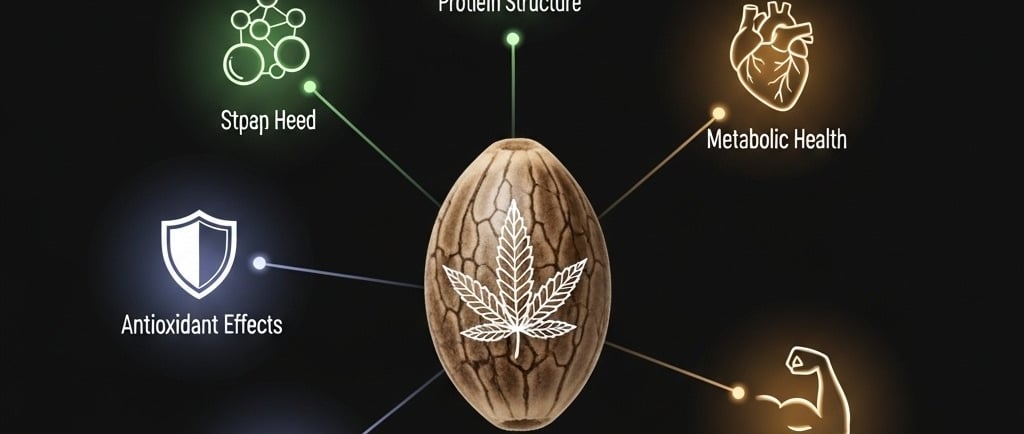Add your promotional text...
Beyond CBD: Unpacking Hemp Seed's Powerful Protein
Source & Further Information: The findings and concepts discussed in this article are largely based on the research presented in the following scientific paper: Zhang X, Zhou W, Qin X, Hou C, Yang X. Preparation, Modification, Food Application, and Health Effects of Protein and Peptide from Hemp (Cannabis sativa L.) Seed: A Review of the Recent Literature. Foods. 2025 Mar 26;14(7):1149. doi: 10.3390/foods14071149. PMID: 40238243; PMCID: PMC11988983. We encourage readers interested in the detailed methodology and complete results to consult the original publication.
8/20/20253 min read


When most people hear "hemp," their minds might go in a few different directions. But beyond the fibers and famous cannabinoids lies a nutritional powerhouse waiting in its seeds. Hemp seed is emerging as a remarkable source of plant-based protein, packed with benefits for our health and the planet. However, unlocking its full potential isn't as simple as just grinding it up. Let's explore the promise, the problems, and the exciting science behind hemp seed protein.
The Promise: A Near-Perfect Plant Protein
Hemp (the non-psychoactive variety with less than 0.3% THC) is an incredibly sustainable crop, requiring less water and fewer pesticides than many alternatives. Its seeds are a true treasure, containing a high concentration of protein that is both high-quality and highly digestible.
Hemp seed protein is primarily made of two types: edestin and albumin. What makes it stand out is its complete amino acid profile, meaning it contains all the essential amino acids our bodies need. In fact, its amino acid content often exceeds the levels recommended by the Food and Agriculture Organization. It's particularly rich in arginine and glutamic acid, making it a fantastic, allergen-free alternative to soy or whey for everything from vegan protein bars to smoothies.
The Problem: Great on Paper, Clumpy in Practice
So why isn't hemp protein in everything? The main issue lies in its "functional properties." Due to its molecular structure, hemp seed protein has a strong tendency to clump together. It doesn't dissolve well in water and has poor emulsifying ability (meaning it's not great at helping oil and water mix). This makes it a tricky ingredient for food manufacturers to work with, limiting its use in a wider range of products.
Unlocking its Potential: Modifying Hemp Protein
To overcome these challenges, scientists are using a toolkit of clever techniques to modify the structure of hemp protein and improve its functionality. These methods fall into three main categories:
Physicochemical: Simple methods like changing the pH (acidity) can help unfold the protein's structure, improving its interaction with water. Other techniques involve using high pressure, ultrasound, or even blending it with other proteins (like faba bean or casein) to improve its texture, solubility, and nutritional profile.
Biological: Nature-inspired methods like germination and fermentation are also proving effective. Germinating hemp seeds triggers natural enzymes that break down the large proteins, while fermenting them with beneficial bacteria (like those in yogurt) can dramatically improve digestibility, solubility, and even create new bioactive compounds.
The Real Treasure: Bioactive Peptides
Perhaps the most exciting area of research involves breaking down hemp protein into its smaller components, called peptides. These short chains of amino acids are not only easier to dissolve and use, but they also possess a wide range of specific health benefits that the larger protein doesn't.
Scientists can create these peptides using enzymes (enzymatic hydrolysis) or even build them from scratch (chemical synthesis). Once isolated, these peptides have been shown to offer remarkable health effects.
Health Benefits of Hemp Protein & Peptides
Research has uncovered a host of benefits, positioning hemp protein as a true functional food:
Antioxidant & Anti-inflammatory: Hemp peptides are powerful antioxidants, helping to protect our cells from damage caused by oxidative stress. They can also help regulate the body's inflammatory response by influencing key cellular pathways.
Metabolic Health: Certain peptides from hemp have shown exciting potential in helping manage metabolic syndrome. They can inhibit enzymes like DPP-IV (improving glucose metabolism, beneficial for managing Type 2 diabetes) and ACE (helping to relax blood vessels, which may help manage mild hypertension).
Intestinal & Muscle Health: Hemp protein has shown prebiotic potential, meaning it can feed the good bacteria in our gut. Furthermore, its peptides have been found to help mitigate muscle atrophy (the loss of muscle mass), making it a promising ingredient for maintaining muscle health, especially during recovery or aging.
A Note of Caution
While hemp protein is generally safe and free of common allergens, the hemp seed itself does contain some proteins that have been identified as potential allergens. Cross-reactivity with things like hazelnuts has also been noted, so further research is still needed in this area.
Conclusion
Hemp seed protein is far more than just a byproduct. It's a sustainable, nutritionally complete protein source with a vast range of potential applications. Through innovative modification techniques and by unlocking the power of its bioactive peptides, scientists are paving the way for hemp to become a staple ingredient not just in our foods, but in products designed to support our overall health and wellness.